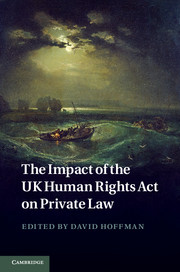Book contents
- Frontmatter
- Contents
- Contributors
- Foreword
- Preface
- Acknowledgements
- Table of cases
- Table of statutes
- Table of statutory instruments
- Table of European Union Legislation
- Abbreviations
- 1 Introduction
- 2 Mapping horizontal effect
- 3 Public authorities: what is a hybrid public authority under the HRA?
- 4 Statute law: interpretation and declarations of incompatibility
- 5 Precedent
- 6 Tort design and human rights thinking
- 7 Privacy: the development of breach of confidence – the clearest case of horizontal effect?
- 8 Nuisance
- 9 Defamation
- 10 Discrimination law
- 11 Damages: private law and the HRA – never the twain shall meet?
- 12 Property and housing
- 13 Commercial law
- 14 Restitution
- 15 Insolvency
- 16 Employment law
- 17 Civil procedure: Article 6 – a welcome boost to the development of English procedural law?
- 18 Conclusions
- Index
- References
7 - Privacy: the development of breach of confidence – the clearest case of horizontal effect?
Published online by Cambridge University Press: 05 November 2011
- Frontmatter
- Contents
- Contributors
- Foreword
- Preface
- Acknowledgements
- Table of cases
- Table of statutes
- Table of statutory instruments
- Table of European Union Legislation
- Abbreviations
- 1 Introduction
- 2 Mapping horizontal effect
- 3 Public authorities: what is a hybrid public authority under the HRA?
- 4 Statute law: interpretation and declarations of incompatibility
- 5 Precedent
- 6 Tort design and human rights thinking
- 7 Privacy: the development of breach of confidence – the clearest case of horizontal effect?
- 8 Nuisance
- 9 Defamation
- 10 Discrimination law
- 11 Damages: private law and the HRA – never the twain shall meet?
- 12 Property and housing
- 13 Commercial law
- 14 Restitution
- 15 Insolvency
- 16 Employment law
- 17 Civil procedure: Article 6 – a welcome boost to the development of English procedural law?
- 18 Conclusions
- Index
- References
Summary
Soon after the Human Rights Act came into force, one commentator suggested that ‘horizontal effect [will] perhaps have its greatest impact in the field of privacy’, and this prediction appears to have been fully vindicated: it is generally acknowledged that it is in the development of breach of confidence into a species of privacy tort that common law horizontal effect has been at its clearest and strongest. Statements by Law Lords in Campbell v. MGN Ltd that ‘The essence of the tort [of breach of confidence] is better encapsulated now as misuse of private information’, followed by the Court of Appeal in Douglas v. Hello! Ltd acknowledging this transformation in bold terms by referring to the ‘action formerly described as breach of confidence’, have had commentators reaching excitedly for their pens to celebrate the new birth. The author has been one of those who have insisted upon the significance of the developments, arguing that they have seen the discarding of one of the key limbs of breach of confidence and the transformation of the other, resulting in at least a de facto new right to privacy. The use of birth metaphors is not just a sign of academic over-excitement, judges have used them too: Jack J in A v. B referred to ‘the law of confidence’ as ‘like a mother swollen with the child of privacy’ who had now ‘given birth and the umbilical cord cut’, although we should immediately note that the typical common law qualifier that this ‘may be’ was added. Perhaps even more significant than this ‘re-christening’ of breach of confidence is the approach taken in the most recent Court of Appeal case, Murray v. Express Newspapers Plc, in which the court, while purportedly dealing with a common law action, appeared to define its key tests in entirely Convention right terms.
On the other hand, and apparently paradoxically, we have the phenomenon of the judges firmly disclaiming any notion that they are creating a new general right to privacy. Most importantly, of course, in Wainwright v. Home Office, the House of Lords unanimously declined to hold that there was any tort of invasion of privacy, as such, in English law. The Court of Appeal in the same case saw formidable ‘definitional difficulties and conceptual problems in the judicial development of a “blockbuster” privacy tort’, and thought the creation of such a tort, even if desirable, as being clearly a task for Parliament, not the judiciary. Instead, Mummery LJ said that the judges preferred ‘the promising and well trod path…of incremental evolution’. Similarly, Woolf CJ, speaking obiter in A v. B Plc strongly steered the lower courts away from considering the development of a free-standing tort of privacy, while Lindsay J, invited in Douglas v. Hello! Ltd to declare a general right to privacy, firmly declined the opportunity.
- Type
- Chapter
- Information
- The Impact of the UK Human Rights Act on Private Law , pp. 136 - 164Publisher: Cambridge University PressPrint publication year: 2011
References
- 19
- Cited by



